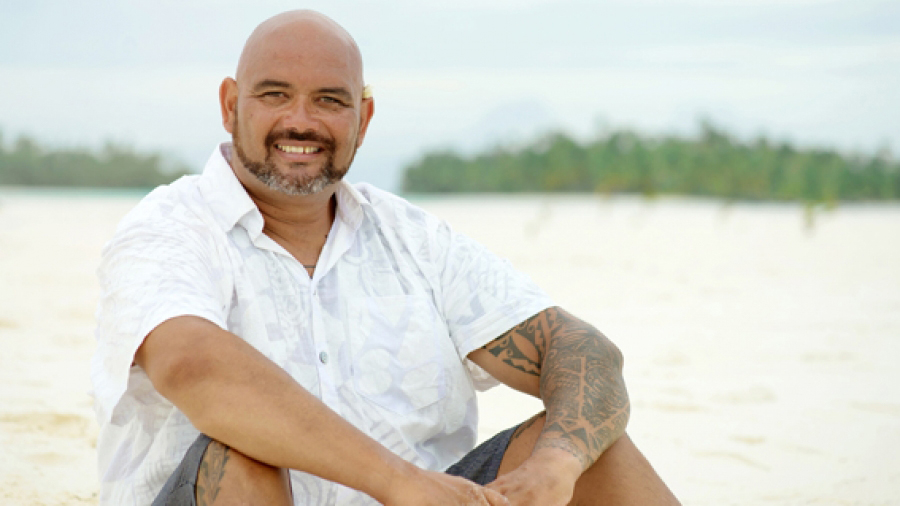Thomas Wynne: Our land, our people
Saturday 27 January 2024 | Written by Thomas Tarurongo Wynne | Published in Editorials, Opinion

Columnist Thomas Tarurongo Wynne. Photo: CI NEWS/16040843
Nothing brings us together or tears us apart like our connection to land, especially when that land is divided, shared, allotted, or occupied by different members of our family, writes Thomas Tarurongo Wynne.
In the recent Cook Islands census, 2021, Cook Islands Māori residing in the Cook Islands now total 11,603, or 77 per cent of the total population.
When compared to the nearly 140,000 Cook Islanders living offshore, the ratio is roughly 12:1, meaning for every one Cook Islander living at home, there are approximately 12 living offshore.
And 23 per cent of our total population in the Cook Islands is now not Cook Islands Māori, or nearly one in every four people we see every day.
And why the need for consultation and the revision of our land laws is essential because they are simply no longer fit for purpose, for the lived reality of those Cook Islands Māori living and residing at home, and those living in New Zealand, Australia, Tahiti and abroad.
The need for change is complex, but falls into two clear pressures – firstly that the law no longer reflects the pressures faced by our communities and/or the way by which families understand, share, revoke, allot or develop land.
And secondly, that the development of the Cook Islands as a country cannot be held back by land that sits idle, vacant, or undeveloped, so as we all who call ourselves and identify as Cook Islanders, can have a home nation that is thriving and prosperous with enough land available to develop, feed and house those that chose to reside in our beautiful Ipukarea.
In 1957 the Land Court, sitting as an Appellate Court, made a ruling that would, according to Dr Ron Crocombe, Dr Makiuti Tongia and Tepoave Araitia in their paper called “Absentee landowners in the Cook Islands: Consequences of change to traditions”, significantly affected land tenure in the Cook Islands.
It ruled that all children inherit equally in all registered native lands of all ancestors. In effect this meant that every person would inherit an equal share in all the lands of both parents, all four grandparents, all eight great-grandparents and so on.
The ruling, which became binding on all Land Court decisions, thereafter, legally destroyed custom on registered native lands and resulted in ever increasing fragmentation of ownership – though many now accept this error as “custom”.
The Cook Islands Act of 1915 has been often described as the “preservation of custom”, but this has been hotly debated as time has gone on, and as we better understand what was “customary” as opposed to what has been customarily practiced in a post 1915 world.
Families in Mangaia, Mitiaro and Pukapuka do not have a Land Court, but one could argue, that in fact it is still families, in all the islands of the Cook Islands that practice custom, regarding land even though it often sits outside of what is legal or enacted in law.
The way we treat occupation rights and succession, which is often outside of the legal framework is a clear indication of this.
The problem we have is if one family member decides to take our families to court on the face of what is legal, not what is practiced, the law will be on their side and not that of what has been “customarily” practiced and understood by many of our families in the Cook Islands or offshore.
To have our Minister for Justice, Vaine “Mac” Mokoroa and the Head of Ministry Tamatoa Jonassen and team come to consult with our people here in New Zealand and Australia, is long overdue and welcomed, and signals we all have a vested interest in how these land law changes are proposed, constructed and make their way through Parliament at the end of 2026.
Clearly, for those that attended, with packed halls and churches, everyone that has land, either resident, or absentee, feels very strongly about the passage of this consultation and change, and seen in the comments and tears, laughter, and joy in those meetings.
On behalf of our people across the Moana, we are grateful for the consultation, and despite some frustrations with the process, it has prompted us to consider and organise meeting again, educating ourselves on land law process, and better understanding the proposed changes so we can provide proper remits in writing back to the Cook Islands government for then to consider. Let the conversation continue.














































